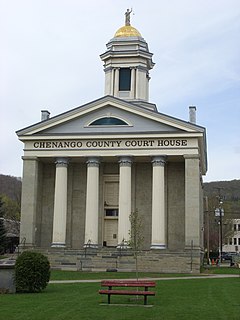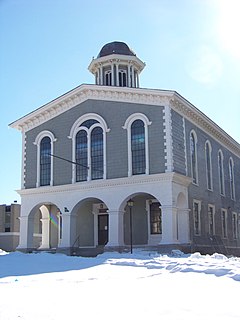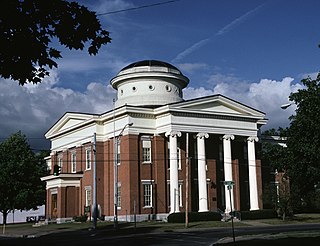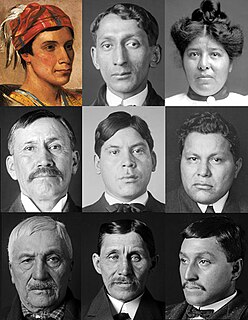
The Oneida Community was a perfectionist religious communal society founded by John Humphrey Noyes in 1848 in Oneida, New York. The community believed that Jesus had already returned in AD 70, making it possible for them to bring about Jesus's millennial kingdom themselves, and be free of sin and perfect in this world, not just in Heaven. The Oneida Community practiced communalism, complex marriage, male sexual continence, and mutual criticism. There were smaller Noyesian communities in Wallingford, Connecticut; Newark, New Jersey; Putney and Cambridge, Vermont. The community's original 87 members grew to 172 by February 1850, 208 by 1852, and 306 by 1878. The branches were closed in 1854 except for the Wallingford branch, which operated until devastated by a tornado in 1878. The Oneida Community dissolved in 1881, and eventually became the giant silverware company Oneida Limited.

Chenango County is a county located in the south-central section U.S. state of New York. As of the 2010 census, the population was 50,477. Its county seat is Norwich. The county's name originates from an Oneida word meaning "large bull-thistle."

Madison County is a county located in the U.S. state of New York. As of the 2010 census, the population was 73,442. Its county seat is Wampsville. The county is named after James Madison, fourth President of the United States of America, and was first formed in 1806.

Oneida County is a county located in the state of New York, in the United States. As of the 2010 census, the population was 234,878. The county seat is Utica. The name is in honor of the Oneida, one of the Five Nations of the Iroquois League or Haudenosaunee, which had long occupied this territory at the time of European encounter and colonization. The federally recognized Oneida Indian Nation has had a reservation in the region since the late 18th century, after the American Revolutionary War.

Oneida is a city in Madison County located west of Oneida Castle and east of Wampsville, New York, United States. The population was 11,390 at the 2010 census. The city, like both Oneida County and the nearby silver and china maker, was named for the Oneida tribe, which had a large territory here around Oneida Lake during the colonial period.

The Battle of Oriskany on August 6, 1777 was one of the bloodiest battles in the North American theater of the American Revolutionary War and a significant engagement of the Saratoga campaign. An American party trying to relieve the siege of Fort Stanwix was ambushed by a party of Loyalists and allies of several American Indian tribes, primarily Iroquois. This was one of the few battles in the war in which almost all of the participants were American; Patriots and allied Oneida fought against Loyalists and allied Indians in the absence of British regular soldiers.

The Oneida are a Native American tribe and First Nations band. They are one of the five founding nations of the Iroquois Confederacy in the area of upstate New York, particularly near the Great Lakes. The Iroquois call themselves Haudenosaunee in reference to their communal lifestyle and the construction style of their dwellings.

John Humphrey Noyes was an American preacher, radical religious philosopher, and utopian socialist. He founded the Putney, Oneida, and Wallingford Communities, and is credited with coining the term "complex marriage".

The Oneida Indian Nation (OIN) or Oneida Nation is a federally recognized tribe of Oneida people in the United States. The tribe is headquartered in New York, where the tribe originated and held its historic territory long before European colonialism. It is an Iroquoian-speaking people, and one of the Five Nations of the Iroquois Confederacy, or Haudenosaunee. Three other federally recognized Oneida tribes operate in locations where they migrated and were removed to during and after the American Revolutionary War: one in Wisconsin in the United States, and two in Ontario, Canada.
Joanne Shenandoah is a singer, composer and acoustic guitarist based in the United States. She is a member of the Wolf Clan; the Oneida Nation is part of the Haudenosaunee. Her music is a combination of traditional songs and melodies with a blend of instrumentation.

Oneida Baptist Institute (OBI) is a coeducational Southern Baptist boarding school in Oneida, Kentucky, affiliated with the Kentucky Baptist Convention.

List of the National Register of Historic Places listings in Oneida County, New York

Oneida is an American experimental rock band from Brooklyn, New York, United States. Their influences include psychedelic rock, krautrock, electronic, noise rock, and minimalism, but the overall structure and intent of their music is not taken directly from any of these styles. Common elements found in their music include improvisation, repetition, driving rhythms, antique and analog equipment, and an overall eclecticism.

The Oneida Nation of Wisconsin is a federally recognized tribe of Oneida people, with a reservation located in parts of two counties on the west side of the Green Bay metropolitan area. The reservation was established by treaty in 1838, and was allotted to individual New York Oneida tribal members as part of an agreement with the U.S. government. The land was individually owned until the tribe was formed under the Indian Reorganization Act of 1934.

Atheists, Reconsider is a split EP between two Brooklyn groups: Oneida and Liars. Each band contributes two original songs, plus one cover of a composition by the other band. Album art designed by Karl LaRocca / Kayrock Screenprinting
Polly Cooper was an Oneida woman from the New York colony who took part in an expedition in 1777 to aid the Continental army during the American Revolution. Troops were camped at Valley Forge, Pennsylvania in winter quarters during 1777–78. She and other Oneida walked hundreds of miles to carry hundreds of bushels of white corn to them.

Romance is the twelfth studio album by alternative rock band Oneida. It was released in 2018 through Joyful Noise Recordings, to generally positive reviews. It is the first album the band produced in a studio setting since the loss of the Ocropolis, which was destroyed when the Monster Island Building came down in 2011 in Brooklyn, as a result of gentrification.















